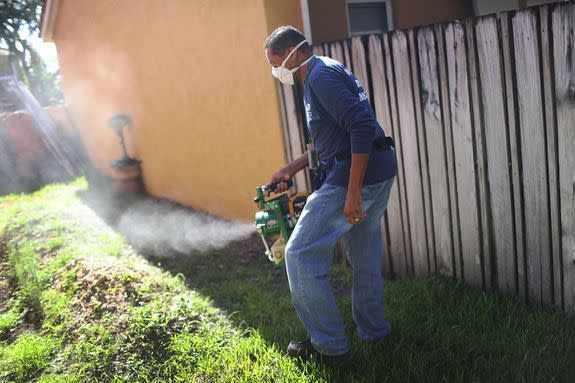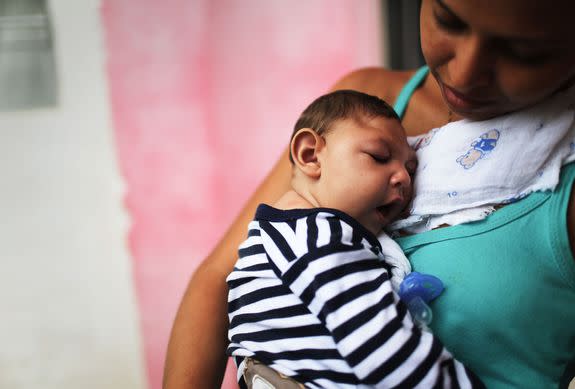Likely Zika outbreak in Florida marks turning point for the U.S.

Mosquitoes in Florida likely infected four people with the Zika virus, Florida officials said Friday.
The likely outbreak is the first time Zika was found to be transmitted via infected mosquitoes in the continental United States, the Centers for Disease Control and Prevention (CDC) confirmed.
The Florida Department of Health said that one woman and three men who had the virus likely got the infection from local mosquitoes.
SEE ALSO: New York City reports first known instance of female-to-male sexual transmission of Zika virus
For now, the department said it believes that active transmission of Zika is happening only in a one-square-mile area in Miami-Dade County, just north of downtown.

Image: Florida Department of Health
“While no mosquitoes trapped tested positive for the Zika virus, the department believes these cases were likely transmitted through infected mosquitoes in this area,” the department said in a news release.
The CDC said more than 1,650 cases of Zika in the U.S. have been reported, but all of those were from travelers returning home after visiting other countries in the Americas and Caribbean.
Of those cases, 15 are believed to be the result of sexual transmission, and one was the result of a laboratory exposure, the CDC said.
The center warned earlier this year that Florida and other Gulf Coast states could see a wave of local Zika infections as temperatures rise and humidity climbs.

Image: CDC
“We continue to recommend that everyone in areas where Aedes aegypti mosquitoes are present — and especially pregnant women — take steps to avoid mosquito bites," Dr. Tom Frieden, director of the CDC, said Friday in a statement.
"We will continue to support Florida’s efforts to investigate and respond to Zika and will reassess the situation and our recommendations on a daily basis,” he added.
Zika experts cautioned Americans against panicking.
The majority of people infected with Zika often don’t show any symptoms, and if they do, the symptoms are often akin to a mild flu or cold, Paul Roepe, co-director of the Georgetown Center for Infectious Disease in Washington, told Mashable.
In the U.S. in particular, the abundance of air conditioning and public spending on mosquito spraying and prevention programs should help to limit the spread of Zika — at least compared to developing countries like Brazil, the epicenter of the Zika outbreak, Janet Smith, who directs the Center for Structural Biology at the University of Michigan's Life Sciences Institute, said in a phone interview.

Image: Getty Images
Smith said that, in response to the Florida outbreak, “There’s going to be some very aggressive mosquito control programs put into effect that we’ll see in the coming days. That’s not part of the response in Brazil.”
However, pregnant women or women who could become pregnant do have plenty of reason to be worried, the experts cautioned.
The Zika virus is known to cause birth defects and brain damage in children whose mothers were infected during pregnancy.
The CDC in April confirmed that Zika is to blame for a rise in newborns with microcephaly, or an unusually small skull.
“We know this virus is most detrimental to expecting mothers,” Florida Gov. Rick Scott said in a statement Friday.

Image: Getty Images
Scott urged women who are pregnant or thinking of becoming pregnant to contact their OB-GYN for guidance.
Not far off the coast of Florida, in Puerto Rico, Zika has been diagnosed in more than 5,500 people as of July 7, including 672 pregnant women, according to a report published Friday in the journal Morbidity and Mortality Weekly Report.
Of those 672 pregnant women, about 66 percent experienced Zika-related symptoms, while 34 percent had no symptoms, the report said.
The World Health Organization estimated Zika could infect millions of people in dozens of countries. In Brazil, more than 1.5 million people have become infected since 2014.

Image: LatinContent/Getty Images
No vaccine or treatment for Zika currently exists. But there are plenty of ways to limit your contact with disease-carrying mosquitoes.
Roepe encouraged people to apply bug spray when going outdoors and wear long sleeves and long pants in wooded or mosquito-dense areas. Also, get rid of any standing water outdoors, including in the gutters, drainage pipes, bird baths, or even bowls of water for pets.
“We could control this, it just means we have to get rid of the mosquitoes in our backyards,” he said.
